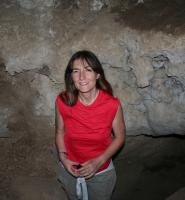Fernández Jalvo Yolanda
- Investigadora Científica
- Departamento: Paleobiología
- Teléfono: 915668965
- Email: yfj@mncn.csic.es
- Número ORCID: 0000-0002-1089-7136
- Palabras clave:

Investigación
My contribution to the field of taphonomy and anthropology is twofold. On the one hand, studies related to research involving human behavior, social strategies, histology, preservation/transformation of organic and inorganic bone components (e.g. collagen, DNA). On the other, my investigations are referred to site formation and interpretations of past environments and climates.
The status of Taphonomy in the scientific scenery of Paleobiology and Paleoanthropology gives special relevance to Taphonomy, because this is a transversal research between taxonomic and geography-geological time, allowing me to participate at the Palaeoanthropological Group of CSIC as team member, and obtaining join projects with members of the Palaeobiology Department of the MNCN (such as M.T.Alberdi on Global Palaeo-Climatic Changes: CGL2016-79334-P). Therefore, I have join projects with members of one and the other groups. In fact, Taphonomy is also transversal with other investigations, such as geology, palaeogenetics, environmental studies, past ecosystem interpretations, as well as Forensic studies and histology. The interest and application of taphonomic principles, experiments and protocols are not only common in Forensic studies, but also applied to other disciplines and investigations, such as handmade objects such lithic tools. The limit of taphonomy is a question of applicability. So far, knowledge could at some extend be applied to interpret how these objects (bone or human-made tools) arrived to our times and which processes allowed them to survive. In this respect, our Laboratory of Experimental Taphonomy (now Laboratory of Environmental Analyses): http://www.mncn.csic.es/es/investigaci%C3%B3n/servicios-cientifico-tecnicos/laboratorio-de-ensayos-ambientales-lealet applied to different objects and objectives. This laboratory is like a "fossils in the making" to reproduce the most intriguing processes in the long history of life forms i.e. fossilization: a combination of physical and chemical conditions which preserved past life forms until today.

